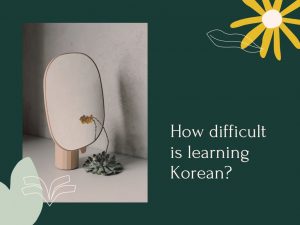
How long does it take to learn Korean? How difficult is it?
I have a full-time job and I self-study Korean in my spare time. On this schedule it is possible to attain beginner level Korean (TOPIK I level 2) in half a year, intermediate level in around one year and advanced level (TOPIK II level 6) in two years.
At the beginning as with learning any other language, there are quite a bit of memorising to get over with. Starting from the Korean alphabet, grammar points and irregularities. However, having got past that point, using materials such as Korean drama, K-pop songs which are the reasons you wanted to learn Korean to begin with, it started to get more fun and rewarding.
At advanced level, when you are able to watch Korean dramas and variety shows understanding a lot more what they are talking about, reading Korean books and online blogs and comments posted by Koreans, basically you are enjoying what you like and at the same time polishing your Korean.
You might not be aware that Korean is a man-made language – which means its alphabet and basic grammar structures are not inherited from generations of common usage as with most languages in the world, but systematically constructed. While there are still a number of irregularities, overall I find the Korean language grammar follows a logical set of rules and hence not too difficult to learn.
Many people started learning the Korean language because of the love of Korean culture, and I am no exception. It defeats the purpose if the process of learning the language is too painful so one gets frustrated and lose interest. Though I did feel a little bit stuck at times, overall I find the experience worthwhile and more fun than I have expected.
I hope you will feel the same with the help of the tips and resources in this website.
Why Korean is easy to learn –
- Phonetic language – once you learn all the alphabet, you can read out loud any Korean words and passages. The alphabets themselves are also extremely straightforward
- Logical – no offence but I find assigning a gender to in animate objects in certain European languages completely beyond me
Why Korean is difficult to learn –
- Politeness levels – Korean has multiple politeness levels; Apart from speech format differences when speaking to people with higher / lower level status, there are also specific ‘honorifics’ (i.e. different words used) when referring to a higher status person.
- Time tenses – There are past, present, future, present continuous, past perfect and future perfect etc, very much like in English. Complex tense structure like ‘.. would have done…’ are very common in speech.
How long does it take to learn Korean to a level such that I can watch Korean shows without subtitles.
I started learning with the same idea in my head and now looking back I realise I could not be more foolish.
If someone can understand Korean shows 100% without subtitles we can say that person is completely fluent in Korean already. In our country we started learning English from kindergarten. One of my friends has moved to Canada at the age of 10 and lived there since then. She still said that she can only understand 90% of American dramas. That tells a lot about how hard it is for a non-native person to be fluent in a language to a level allowing him to understand casual and professional conversations between natives.
While I was at absolute beginner level I tried to decipher some quotes from dramas I loved, and found that I could hardly understand one word of it even with the help of a dictionary. It was only when I have built a solid foundation of grammar structures then I start to understand the skeleton of the sentence spoken, and the remaining was a matter of practicing listening and building up vocabulary.
There are no shortcuts to learning a language – let’s start from the very beginning and take it one step by another.
As a french person, the logical part make me laugh (there’s no logic in gender in french) and tysm for wrote what was hard in korean, because nobody talk about the hard part (there’s already a lot of time tenses in french, i hope is not gonna be hard like in french)
Thank you (again) for this 🙂
(My english is not very good sorry)
One of the best resources I’ve come across. Very useful and well-written.